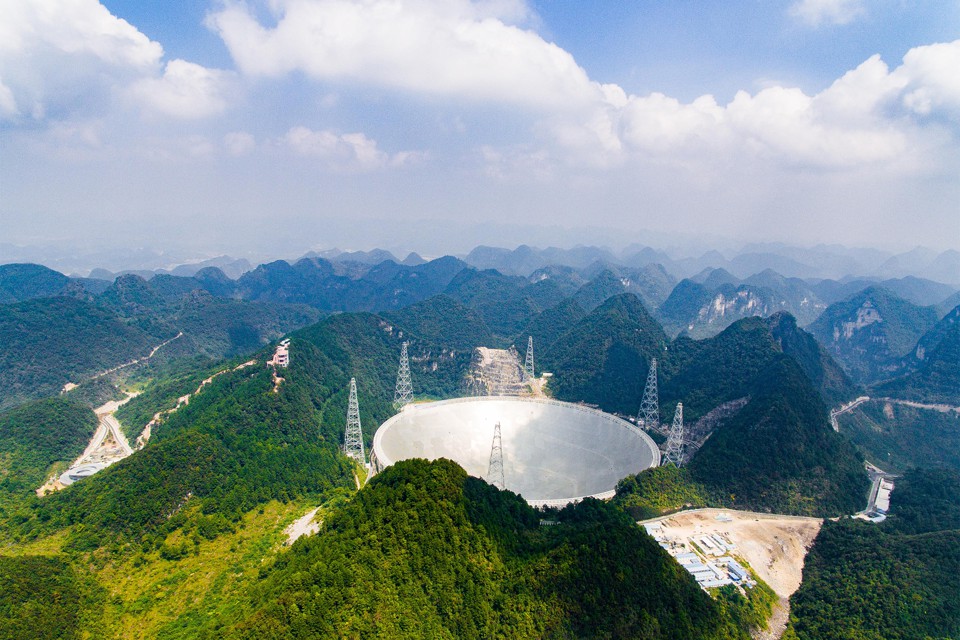As America has turned away from searching for extraterrestrial intelligence, China has built the world’s largest radio dish for precisely that purpose. Last January, the Chinese Academy of Sciences invited Liu Cixin, China’s preeminent science-fiction writer, to visit its new state-of-the-art radio dish in the country’s southwest. Almost twice as wide as the dish at America’s Arecibo Observatory.
Arecibo Observatory is
located in the Puerto Rican jungle. The new Chinese dish is the largest in the
world, if not the universe. Though it is sensitive enough to detect spy
satellites even when they’re not broadcasting, its main uses will be
scientific, including an unusual one: The dish is Earth’s first flagship
observatory custom-built to listen for a message from an extraterrestrial
intelligence. If such a sign comes down from the heavens during the next
decade, China may well hear it first.
In some ways, it’s no
surprise that Liu was invited to see the dish. He has an outsize voice on
cosmic affairs in China, and the government’s aerospace agency sometimes asks
him to consult on science missions. Liu is the patriarch of the country’s
science-fiction scene. Other Chinese writers I met attached the honorific Da,
meaning “Big,” to his surname. In years past, the academy’s engineers sent Liu
illustrated updates on the dish’s construction, along with notes saying how
he’d inspired their work.
But in other ways Liu is a
strange choice to visit the dish. He has written a great deal about the risks
of first contact. He has warned that the “appearance of this Other” might be
imminent, and that it might result in our extinction.
“Perhaps in ten thousand
years, the starry sky that humankind gazes upon will remain empty and silent,”
he writes in the postscript to one of his books. “But perhaps tomorrow we’ll
wake up and find an alien spaceship the size of the Moon parked in orbit.”
 |
| China’s new radio dish was custom-built to listen for an extraterrestrial message. (Liu Xu / Xinhua / Getty) |
In recent years, Liu has
joined the ranks of the global literati. In 2015, his novel The
Three-Body Problem became the first work in translation to win the
Hugo Award, science fiction’s most prestigious prize. Barack Obama told The
New York Times that the book—the first in a trilogy—gave him cosmic perspective during the frenzy of his presidency. Liu told
me that Obama’s staff asked him for an advance copy of the third volume.
At the end of the second
volume, one of the main characters lays out the trilogy’s animating philosophy.
No civilization should ever
announce its presence to the cosmos, he says. Any other civilization that
learns of its existence will perceive it as a threat to expand—as all
civilizations do, eliminating their competitors until they encounter one with
superior technology and are themselves eliminated.
This grim cosmic outlook is
called “dark-forest theory,” because it conceives of every civilization in the
universe as a hunter hiding in a moonless woodland, listening for the first
rustlings of a rival.
Liu’s trilogy begins in the
late 1960s, during Mao’s Cultural Revolution, when a young Chinese woman sends
a message to a nearby star system. The civilization that receives it embarks on
a centuries-long mission to invade Earth, but she doesn’t care; the Red Guard’s
grisly excesses have convinced her that humans no longer deserve to survive.
En route to our planet, the
extraterrestrial civilization disrupts our particle accelerators to prevent us
from making advancements in the physics of warfare, such as the one that
brought the atomic bomb into being less than a century after the invention of
the repeating rifle. Science fiction is sometimes described as a literature of
the future, but historical allegory is one of its dominant modes.
Isaac Asimov based his
Foundation series on classical Rome, and Frank Herbert’s Dune borrows plot
points from the past of the Bedouin Arabs. Liu is reluctant to make connections
between his books and the real world, but he did tell me that his work is
influenced by the history of Earth’s civilizations, “especially the encounters
between more technologically advanced civilizations and the original settlers
of a place.”
One such encounter occurred
during the 19th century, when the “Middle Kingdom” of China, around which all
of Asia had once revolved, looked out to sea and saw the ships of Europe’s
seafaring empires, whose ensuing invasion triggered a loss in status for China
comparable to the fall of Rome.
“It looks like something
out of science fiction,” Liu said. This past summer, I
traveled to China to visit its new observatory, but first I met up with Liu in
Beijing. By way of small talk, I asked him about the film adaptation of The
Three-Body Problem. “People here want it to be China’s Star Wars,” he said,
looking pained. The pricey shoot ended in mid-2015, but the film is still in
postproduction. At one point, the entire special-effects team was replaced.
“When it comes to making science-fiction movies, our system is not mature,” Liu
said.
I had come to interview Liu in his capacity as China’s foremost
philosopher of first contact, but I also wanted to know what to expect when I
visited the new dish. After a translator relayed my question, Liu stopped
smoking and smiled.
A week
later, I rode a bullet train out of Shanghai, leaving behind its purple Blade
Runner glow, its hip cafés and craft-beer bars. Rocketing along an elevated
track, I watched high-rises blur by, each a tiny honeycomb piece of the
rail-linked urban megastructure that has recently erupted out of China’s
landscape. China poured more concrete from 2011 to 2013 than America did during
the entire 20th century.
The
country has already built rail lines in Africa, and it hopes to fire bullet
trains into Europe and North America, the latter by way of a tunnel under the
Bering Sea.
The
skyscrapers and cranes dwindled as the train moved farther inland. Out in the
emerald rice fields, among the low-hanging mists, it was easy to imagine
ancient China—the China whose written language was adopted across much of Asia;
the China that introduced metal coins, paper money, and gunpowder into human
life; the China that built the river-taming system that still irrigates the
country’s terraced hills.
Those
hills grew steeper as we went west, stair-stepping higher and higher, until I
had to lean up against the window to see their peaks. Every so often, a Hans
Zimmer bass note would sound, and the glass pane would fill up with the smooth,
spaceship-white side of another train, whooshing by in the opposite direction
at almost 200 miles an hour.
It
was mid-afternoon when we glided into a sparkling, cavernous terminal in
Guiyang, the capital of Guizhou, one of China’s poorest, most remote provinces.
A government-imposed social transformation appeared to be under way. Signs
implored people not to spit indoors. Loudspeakers nagged passengers to “keep an
atmosphere of good manners.” When an older man cut in the cab line, a security
guard dressed him down in front of a crowd of hundreds.
The
next morning, I went down to my hotel lobby to meet the driver I’d hired to
take me to the observatory. Two hours into what was supposed to be a four-hour
drive, he pulled over in the rain and waded 30 yards into a field where an
older woman was harvesting rice, to ask for directions to a radio observatory
more than 100 miles away.
After
much frustrated gesturing by both parties, she ultimately pointed the way with
her scythe. We set off again, making our way through a string of small
villages, beep-beeping motorbike riders and pedestrians out of our
way. Some of the buildings along the road were centuries old, with upturned
eaves; others were freshly built, their residents having been relocated by the
state to clear ground for the new observatory.
A
group of the displaced villagers had complained about their new housing,
attracting bad press—a rarity for a government project in China. Western
reporters took notice. “China Telescope to Displace 9,000 Villagers in Hunt for Extraterrestrials,” read
a headline in The New York Times.
he
search for extraterrestrial intelligence (seti) is often derided as a kind
of religious mysticism, even within the scientific community. Nearly a quarter
century ago, the United States Congress defunded America’s seti program with a budget amendment proposed by
Senator Richard Bryan of Nevada, who said he hoped it would “be the end of
Martian-hunting season at the taxpayer’s expense.” That’s one reason it is
China, and not the United States, that has built the first world-class radio
observatory with seti as a core scientific goal.
This
interview was published in The Atlantic Interview. You can read the whole interview here.


Ok. Just one thing. Please. The Puerto Rican Jungle???? I grew up and lived in Puerto Rico all my life, until 2015. There are no "jungles" there! Rainforests, yes. And they suffered greatly because of Hurricane María. Thankfully, Nature, left to her own devices, without human intervention, makes a speedy and healthy recovery.
ReplyDeleteOne thing please? Don't correct people on a language you are not proficient in.
DeleteJungle - Wikipedia
https://en.wikipedia.org/wiki/Jungle
A jungle is land covered with dense vegetation dominated by trees